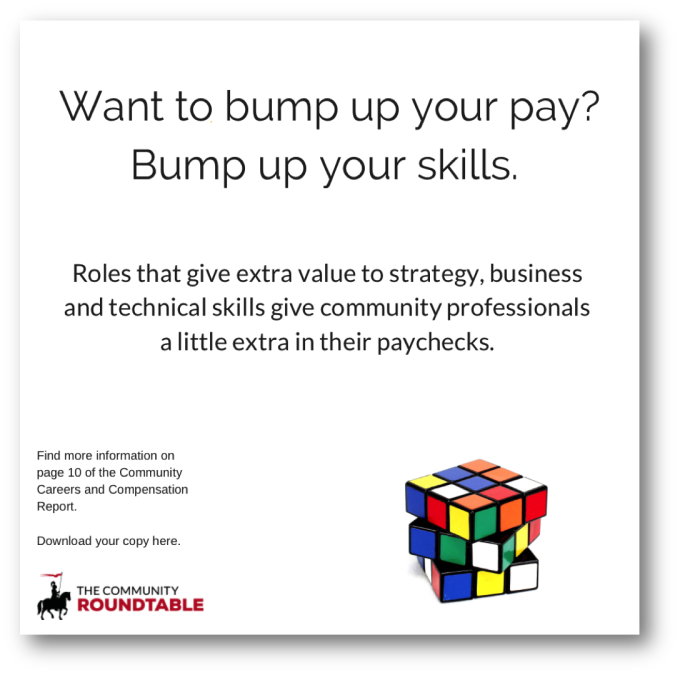By Ted McEnroe, Head of Research, The Community Roundtable
One of the target goals that we had for the Community Careers and Compensation survey in 2015 was to be able to shed more light on the skills of community. That’s why we undertook a significant review and revision of the Community Skills Framework, growing it from 37 to 50 skills overall. We also changed the lens for how we looked at those skills. In 2014, we wanted to know if you had a skill and/or responsibility for that skill in your role. This year, we asked how much value each skill had to you.
The difference is subtle but significant. You may have a skill. You may even be responsible for using it. But you may think it’s not really valuable for your community role. For example, a Director of Community may know how to moderate. They may even have titular responsibility for moderation in the community (because they oversee moderators). But the ability to moderate is not something they might use on a daily basis.
Looking at the skills framework in this way, we saw something interesting happen. We started to see a connection between some of the skills people valued most and their compensation.
Take business skills. Those who said business skills had the greatest value for them in their role earned an average of over $97,000 per year, compared with our overall average of just under $85,000. Those who scored strategic skills highly benefitted, too. They earned an average of about $91,000 – a slight but noticeable bump over the overall average. Both of those results fall into the “noteworthy but not surprising” category: those who most highly valued business skills were more likely to be Directors of Community, and those who valued strategy were more likely to be community strategists (and make higher salaries in those roles.)
But a third set of skills also generated value. Those who valued technical skills in their jobs earned a premium over the average as well, but they weren’t any more likely to be higher up the org chart. Our tech specialists parlayed their skills to an average salary of over $92,000.*

What does it all mean? It highlights three types of career paths for community professionals.
- An upward path – where a community manager sharpens their business skills and moves into a Director of Community role overseeing a community program, for example.
- An outward path – where a community manager focuses on a specialty and builds that out across a number of communities as a community strategist, for example.
- A skill-based path – where a community manager parlays an interest in a specific (often technical) skill into a more important role, whether or not they move up the organizational chart.
One reason this technical path exists is the nature of technical skills. Unlike content skills, which are more-or-less universally beneficial to community team members, you don’t need everyone on your team to be understand data manipulation, API creation or UX design. But having one team member with those skills is a huge benefit, and not always easy to find or keep.
Needed + in demand = more highly paid.
That’s great news for community professionals. We don’t just see a single way up the career ladder, we see three possible options that allow people with different strengths to grow and succeed.
And that can pay great dividends for communities in the long run, giving them opportunities to retain a wider range of talent.
*-These numbers have been updated with new data we have received since the data deadline for the CCC report. The original numbers were $96,000 for business skills, $90,000 for strategic and $89,000 for technical skills.
Want to learn more about the skills that matter for community professionals and the career opportunities that await. The full Community Careers and Compensation report is only available to survey participants and members of TheCR Network, our network of community professionals. Take the survey at https://the.cr/ccc2015survey, or learn more about the exclusive programming and benefits of TheCR Network!
